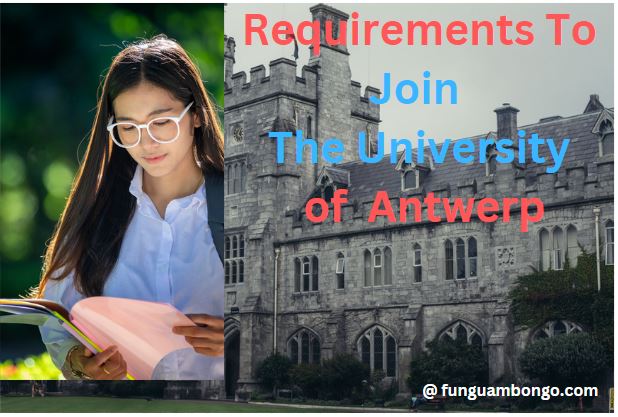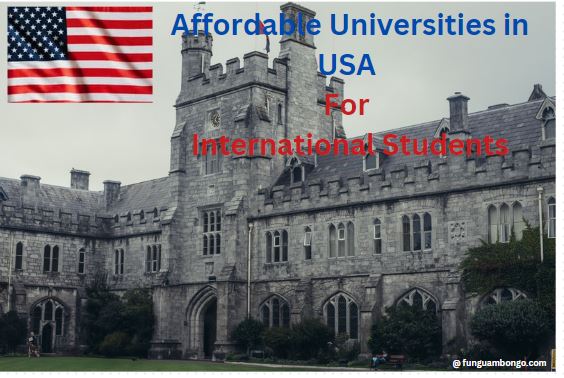Admission requirements to join universities in Belgium can be confusing and overwhelming, especially for international students. However, understanding the admission requirements is crucial to ensure that the application process goes smoothly. This article will provide an overview of the admission requirements for undergraduate, master’s, and doctoral studies, as well as application deadlines, tuition fees, and financial aid.
Admission Requirements to Join Universities in Belgium
To apply for undergraduate studies at a Belgian university, students must have a secondary school diploma that is recognized by the Belgian authorities. Additionally, students must demonstrate proficiency in the language of instruction, which is usually either Dutch, French, or German. For master’s studies, students must have a bachelor’s degree or equivalent and meet the language requirements. Doctoral studies require a master’s degree or equivalent, and students must also demonstrate research skills and a clear research proposal.
It is important to note that admission requirements may vary depending on the university and the program of study. Therefore, it is recommended that students check the specific admission requirements for their chosen university and program. Additionally, students should be aware of the application deadlines and tuition fees, as well as the financial aid options available to them.
General Admission Requirements
To study in Belgium, students need to meet certain admission requirements set by the universities. The general admission requirements for universities in Belgium are as follows:
Academic Qualifications
Applicants must have completed their secondary education and obtained a diploma that is recognized by the Belgian government. The admission requirements also depend on the chosen academic level and field of study. For instance, some programs require a specific set of subjects to be taken at the secondary level, while others may require a certain grade point average (GPA) or standardized test scores.
Language Proficiency
Belgium has three official languages: Dutch, French, and German. Therefore, students must demonstrate their proficiency in the language of instruction of their chosen program. The language proficiency requirements vary depending on the program and the university. Some universities require a minimum score on language proficiency tests such as TOEFL, IELTS, or Cambridge English, while others may have their own language proficiency tests.
Visa and Residence Permits
International students who are not citizens of the European Union (EU), European Economic Area (EEA), or Switzerland are required to obtain a student visa and a residence permit before they can study in Belgium. The visa and residence permit application process can take several weeks, so students are advised to start the process as early as possible. In addition, students must have proof of sufficient financial resources to support themselves during their stay in Belgium.
Overall, meeting the general admission requirements is the first step towards studying at a university in Belgium. Prospective students are advised to check the specific admission requirements of their chosen program and university to ensure that they meet all the necessary criteria.
Undergraduate Studies
Belgium is home to some of the best universities in Europe, and studying there can be a great option for students looking to pursue undergraduate studies. The admission requirements for undergraduate studies in Belgium can vary depending on the university and program that a student is interested in. However, there are some general requirements that apply to most universities in Belgium.
Secondary Education Credentials
To be eligible for admission to an undergraduate program in Belgium, students must have a secondary education credential that is recognized by the university. This typically means that students must have completed a high school diploma or its equivalent in their home country. Additionally, students may be required to have completed specific courses or have achieved a certain grade point average in their secondary education.
Entrance Examinations
In some cases, universities in Belgium may require students to take an entrance examination as part of the admission process. For example, students who wish to study medicine or dentistry in Belgium are required to take a mandatory entrance exam organized by ARES. Moreover, medicine and dentistry programs limit the number of non-resident students who can enroll for the first time in the Wallonia-Brussels Federation.
Application Procedures
The application procedure for undergraduate studies in Belgium can vary depending on the university and program. Generally, students are required to submit an application form along with supporting documents such as transcripts, language proficiency test scores, and a personal statement. It is important for students to check the specific application requirements for the universities and programs they are interested in.
In conclusion, undergraduate admission requirements in Belgium vary depending on the university and program. However, having a recognized secondary education credential, taking entrance examinations, and submitting a complete application are some of the general requirements that students should be aware of.
Master’s Studies
If you are interested in pursuing a master’s degree in Belgium, you must meet certain admission requirements. In this section, we will discuss the different requirements that you need to fulfill to join the universities in Belgium for a master’s degree.
Bachelor’s Degree Requirements
To be eligible for a master’s program in Belgium, you must hold a bachelor’s degree or an equivalent degree from a recognized institution. The degree must be in the same field or a related field as the master’s program you are applying for.
Specific Course Prerequisites
In addition to the bachelor’s degree, some master’s programs in Belgium may require specific course prerequisites. These prerequisites may include certain courses that you must have completed during your bachelor’s degree or additional courses that you must complete before starting the master’s program. It is important to check the specific requirements of the program you are interested in to ensure that you meet all the prerequisites.
Letters of Recommendation
Most master’s programs in Belgium require applicants to submit letters of recommendation. These letters should come from professors or professionals who are familiar with your academic or professional work. The letters should highlight your strengths and abilities and provide insight into your potential as a graduate student.
In conclusion, if you are interested in pursuing a master’s degree in Belgium, you must meet certain admission requirements. These requirements include holding a bachelor’s degree, fulfilling specific course prerequisites, and submitting letters of recommendation. It is important to check the specific requirements of the program you are interested in to ensure that you meet all the prerequisites.
Doctoral Studies
To apply for a doctoral program in Belgium, the applicant must have a master’s degree or equivalent. The degree must be recognized by the Belgian government, and the applicant must provide proof of this recognition. The admission process for doctoral studies in Belgium is highly competitive, and the applicant must meet several requirements to be accepted into a program.
Master’s Degree Requirements
As mentioned earlier, a master’s degree or equivalent is required to be eligible for a doctoral program in Belgium. The applicant must have completed this degree with a minimum grade of 70% or equivalent. The degree must be in a field related to the doctoral program the applicant is applying for.
Research Proposal Submission
In addition to meeting the master’s degree requirements, the applicant must submit a research proposal. The research proposal should outline the applicant’s research interests, the research problem, and the proposed methodology. The research proposal should also demonstrate the applicant’s ability to conduct research in the chosen field.
Supervisor Acceptance
The applicant must also find a supervisor who is willing to supervise their research. The supervisor must be a faculty member at the university where the applicant is applying. The applicant must provide a letter of acceptance from the supervisor along with their application.
In summary, to be accepted into a doctoral program in Belgium, the applicant must have a master’s degree or equivalent, submit a research proposal, and find a supervisor who is willing to supervise their research. The admission process is highly competitive, and the applicant must meet all the requirements to be accepted into a program.
Application Deadlines and Timeline
Applying for admission to a university is a process that requires careful planning and attention to deadlines. In Belgium, universities have varying application deadlines, and students are advised to check with their preferred institutions to ensure they meet the requirements.
Most universities in Belgium have two application periods: one for EU students and another for non-EU students. The application period for EU students usually starts in February and ends in September, while the application period for non-EU students is between October and January. It is essential to note that some courses have earlier deadlines, and students are advised to check with their preferred institutions.
It is also important to note that some universities in Belgium require students to apply through the central application system, while others allow students to apply directly to the institution. Students are advised to check with their preferred institutions to ensure they understand the application process.
In summary, students applying to universities in Belgium need to pay attention to the application deadlines and ensure they meet the requirements. It is essential to check with the preferred institutions to understand the application process and meet all the requirements.
Tuition Fees and Financial Aid
Tuition Costs
Belgium universities charge tuition fees based on the number of credits a student registers for. The tuition fees for Bachelor’s programs are generally lower than those for Master’s programs. The cost of tuition varies depending on the university and the program. For instance, the University of Antwerp charges €938 for a Bachelor’s program and €938 for a Master’s program per year. On the other hand, the Brussels School of Governance charges around €15,000 per year for both Bachelor’s and Master’s programs.
Scholarships and Grants
Belgium universities offer various scholarships and grants to students who meet the eligibility criteria. The scholarships and grants are available for both domestic and international students. Students can apply for scholarships and grants based on their academic achievements, financial need, and other factors.
The Belgian Government offers scholarships to international students through the Belgian Development Cooperation. The scholarship covers tuition fees, accommodation, and other expenses. The scholarship is available for students from developing countries who wish to pursue a Master’s degree in Belgium.
Apart from government scholarships, students can also apply for scholarships offered by private organizations and foundations. For instance, the Flemish Government offers scholarships to students from developing countries who wish to pursue a Master’s degree in Flanders. The scholarship covers tuition fees, accommodation, and other expenses.
In addition to scholarships, students can also apply for grants to cover their living expenses. The grants are available for students who face financial difficulties and cannot afford to pay for their living expenses. Students can apply for grants through the university they are enrolled in.
Student Life in Belgium
Accommodation
Finding accommodation in Belgium can be a challenge, but there are many options available for students. Many universities have student housing on or near campus, which can be a convenient and affordable option. Students can also choose to rent a room or apartment in the city, which can be more expensive but offers more independence.
It is recommended that students begin their search for accommodation as early as possible, as demand can be high in popular areas. Some websites like HousingAnywhere and Kotweb are helpful resources for finding accommodation in Belgium.
Cultural Integration
Belgium is a diverse and multicultural country, and students can expect to encounter a variety of cultures and languages during their time there. While the official languages of Belgium are Dutch, French, and German, many Belgians also speak English.
To help students integrate into Belgian culture, many universities offer cultural exchange programs and language courses. These programs can provide students with an opportunity to learn about Belgian culture and customs, as well as practice their language skills.
Belgium also has a rich cultural heritage, with many museums, galleries, and historical sites to explore. Students can visit the famous Atomium in Brussels, the historic city center of Bruges, or the beautiful Ardennes forest. Additionally, Belgium is known for its delicious cuisine, including waffles, chocolate, and beer, which students can enjoy during their stay.
Frequently Asked Questions
What are the general admission requirements for international students wishing to enroll in Belgian universities?
Belgian universities have certain general admission requirements for international students. Firstly, students must have a high school diploma or an equivalent qualification. Secondly, they must meet the language proficiency requirements of the program they wish to apply for. Thirdly, they must meet the specific admission requirements of the university and program they are applying to.
Are there specific language proficiency tests required for admission to English-taught programs in Belgium?
Yes, there are specific language proficiency tests required for admission to English-taught programs in Belgian universities. Some universities accept IELTS, TOEFL, or Cambridge English tests, while others have their own language proficiency tests. The minimum score required varies depending on the program and university.
What documents are typically needed for university applications in Belgium for international students?
International students applying to Belgian universities are typically required to submit the following documents: a completed application form, a copy of their high school diploma or equivalent qualification, a transcript of grades, a copy of their passport, a language proficiency certificate, and a motivation letter.
How do tuition fees vary for international students at public universities in Belgium?
Tuition fees for international students at public universities in Belgium vary depending on the program and the university. In general, tuition fees for international students are higher than those for Belgian students. However, some universities offer scholarships and financial aid to international students.
What are the application deadlines for universities in Belgium for international students?
The application deadlines for universities in Belgium for international students vary depending on the university and program. Generally, the application period for the academic year starting in September begins in January and ends in April. However, some universities have earlier or later application deadlines.
Do Belgian universities require standardized tests like the SAT for admission?
Belgian universities do not require standardized tests like the SAT for admission. However, some universities may require a specific subject test or aptitude test for certain programs. It is important to check the admission requirements of the university and program you are applying to.
Also Read:
- Best Universities in Belgium for International Students: Top Picks and Tips
- How To Trade Forex For Beginners: A Clear Guide
- Best Funded Companies in Forex Markets: Top Players in the Industry
- The Best Universities in Germany For International Students: A Comprehensive Guide
- Most Highest Countries With High CPM For Google AdSense: A Comprehensive List















Leave a Reply
View Comments